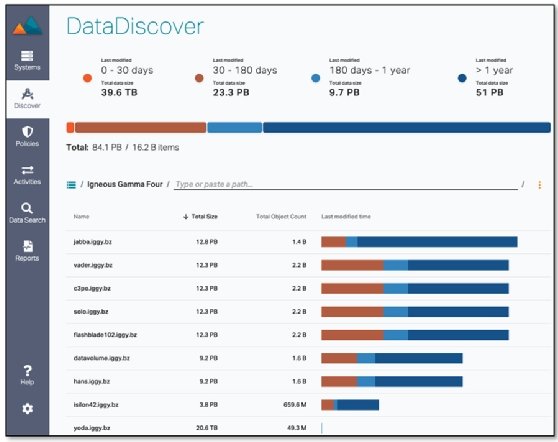
Minerva Studio - Fotolia
Igneous Systems enhances DataDiscover with global search
Igneous Systems' upgrades to DataDiscover and DataFlow address unstructured data growth by allowing customers with massive data sets to see everything they have and move it anywhere.
Unstructured data growth continues to be a problem that cannot be solved simply by throwing more storage at it.
This week, Igneous Systems unveiled improvements to its DataDiscover and DataFlow products. DataDiscover gives organizations a global catalog of all their data, wherever it is, and DataFlow is Igneous' workflow automation tool.
Igneous added customer views, granular search and end-user sharing options to DataDiscover. DataFlow now provides large-scale migration capabilities between NAS devices, NAS to cloud file systems or NAS to cloud object storage. These features will become available on May 14, 2020.
Igneous Systems is a data protection and management vendor specializing in unstructured data. It targets industries that typically hold petabytes of data, such as media and entertainment, AI and machine learning, and life sciences and research. It has three core SaaS-based offerings: DataDiscover, DataFlow and DataProtect. Respectively, they help organizations find data, move data and protect data. All three services are delivered on a single interface.
Christian Smith, vice president of products at Igneous Systems, said organizations storing 10 or more petabytes of data isn't a new phenomenon anymore, and they need better ways of managing data at that scale. The first iteration of DataDiscover was focused on providing visibility and identifying hot and cold data. Simply showing an organization that 50% or more of its data sitting in NAS devices was cold helped it adjust storage practices and save money.
The enhancement added a granular, filterable search to DataDiscover. The service allows users to search by file extensions, making it easier to specifically find movie files or genetic sequencing data. Users can also search by group IDs, which is useful for quickly identifying all data tied to a particular project. A new DataDiscover feature also allows the search results to be shared with collaborators, without granting them full access to the global catalog.

"It is absolutely meant to find that needle in the haystack," Smith said.
Aparavi has a similar search engine capability for its Active Archive cloud data protection and management platform.
Christophe Bertrand, senior analyst at Enterprise Strategy Group (ESG), pointed out that although Igneous targets organizations with petabyte-scale data sets, all verticals have to address unstructured data growth. He said products like DataDiscover are fundamental for compliance and security reasons, especially in a world with the European Union's General Data Protection Regulation and the California Consumer Privacy Act. Indexing all incoming data, knowing where it's stored and making it all searchable are useful for minimizing business risk.
"You have to understand everything you have," Bertrand said.
DataFlow's new migration capabilities are aimed at moving large sets of data in its native format to NFS, SMB or S3, on premises or in the cloud. Smith described it as solving the problem of bringing data to compute in a vendor-agnostic way -- a migration method that works on any source or target platform. Use cases include moving AI and machine learning workloads to cloud to access more compute resources, or simply moving workloads between devices within a data center.
DataFlow will not support cloud-to-cloud migration with this round of upgrades, but Smith said the long-term plan is to make every direction of migration possible.
Igneous did not provide detailed cost information on the new upgrades. DataDiscover is currently $24,000 per year per VM in its current form, and the search capabilities will be an additional cost on top of it. DataFlow will be charged on a per-VM basis.
ESG's Bertrand said Igneous is evolving toward intelligent business management. Many data protection vendors, including Cohesity, Rubrik and Actifio, have developed products that enabled their customers to get secondary uses out of their backup data. In Bertrand's maturity model, the ability to index and make sense of data is the first step to deriving useful business outcomes out of it. Nothing can be achieved from unidentified "dark" data.
Bertrand also called out the importance of DataFlow's vendor-agnostic method of handling data migration. His research found companies want flexibility and simplicity, and to not have to worry about whether a product they've invested in will work after the next NAS refresh is a strong incentive. He believes vendors that provide customers with options and automation will find greater success.
"[Igneous] is doubling down on what really matters," Bertrand said.





